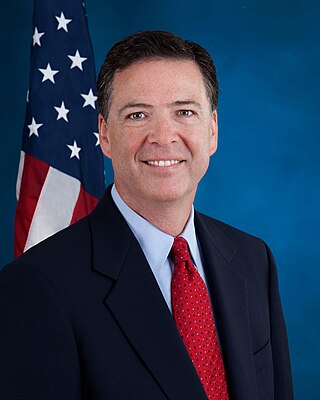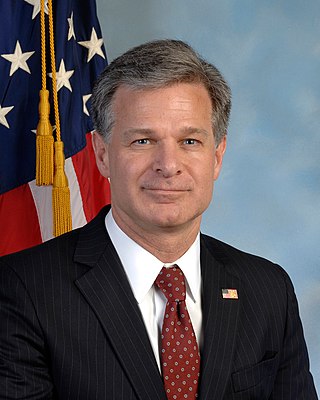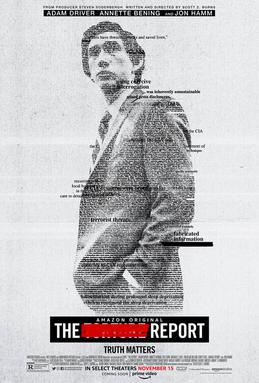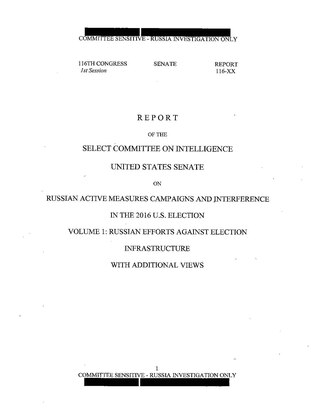
Jesselyn Radack is an American national security and human rights attorney known for her defense of whistleblowers, journalists, and hacktivists. She graduated from Brown University and Yale Law School and began her career as an Honors Program attorney at the U.S. Department of Justice.

James Brien Comey Jr. is an American lawyer who was the seventh director of the Federal Bureau of Investigation (FBI) from 2013 until his dismissal in May 2017. Comey was a registered Republican for most of his adult life; however, in 2016, he described himself as unaffiliated.

NSA warrantless surveillance — also commonly referred to as "warrantless-wiretapping" or "-wiretaps" — refers to the surveillance of persons within the United States, including U.S. citizens, during the collection of notionally foreign intelligence by the National Security Agency (NSA) as part of the Terrorist Surveillance Program. In late 2001, the NSA was authorized to monitor, without obtaining a FISA warrant, phone calls, Internet activities, text messages and other forms of communication involving any party believed by the NSA to be outside the U.S., even if the other end of the communication lays within the U.S.

MAINWAY is a database maintained by the United States' National Security Agency (NSA) containing metadata for hundreds of billions of telephone calls made through the largest telephone carriers in the United States, including AT&T, Verizon, and T-Mobile.

Kohn, Kohn & Colapinto is a Washington, D.C.-based international whistleblower rights law firm specializing in anti-corruption and whistleblower law, representing whistleblowers who seek rewards, or who are facing employer retaliation, for reporting violations of the False Claims Act, Foreign Corrupt Practices Act, Dodd-Frank Wall Street Reform, Sarbanes-Oxley Acts, Commodity and Security Exchange Acts and the IRS Whistleblower law.

James Robert Clapper Jr. is a retired lieutenant general in the United States Air Force and former Director of National Intelligence. Clapper has held several key positions within the United States Intelligence Community. He served as director of the Defense Intelligence Agency (DIA) from 1992 until 1995. He was the first director of defense intelligence within the Office of the Director of National Intelligence and simultaneously the Under Secretary of Defense for Intelligence. He served as the director of the National Geospatial-Intelligence Agency (NGA) from September 2001 until June 2006.

Trailblazer was a United States National Security Agency (NSA) program intended to develop a capability to analyze data carried on communications networks like the Internet. It was intended to track entities using communication methods such as cell phones and e-mail.

Julian Paul Assange is an Australian editor, publisher, and cypherpunk activist. He was convicted in Australia for hacking in 1996. He founded WikiLeaks in 2006; the organisation came to international attention in 2010 when it published a series of leaks provided by U.S. Army intelligence analyst Chelsea Manning. After the 2010 leaks, the United States government launched a criminal investigation into WikiLeaks.

Thomas Andrews Drake is a former senior executive of the National Security Agency (NSA), a decorated United States Air Force and United States Navy veteran, and a whistleblower. In 2010, the government alleged that Drake mishandled documents, one of the few such Espionage Act cases in U.S. history. Drake's defenders claim that he was instead being persecuted for challenging the Trailblazer Project. He is the 2011 recipient of the Ridenhour Prize for Truth-Telling and co-recipient of the Sam Adams Associates for Integrity in Intelligence (SAAII) award.

PRISM is a code name for a program under which the United States National Security Agency (NSA) collects internet communications from various U.S. internet companies. The program is also known by the SIGAD US-984XN. PRISM collects stored internet communications based on demands made to internet companies such as Google LLC under Section 702 of the FISA Amendments Act of 2008 to turn over any data that match court-approved search terms. Among other things, the NSA can use these PRISM requests to target communications that were encrypted when they traveled across the internet backbone, to focus on stored data that telecommunication filtering systems discarded earlier, and to get data that is easier to handle.

The practice of mass surveillance in the United States dates back to wartime monitoring and censorship of international communications from, to, or which passed through the United States. After the First and Second World Wars, mass surveillance continued throughout the Cold War period, via programs such as the Black Chamber and Project SHAMROCK. The formation and growth of federal law-enforcement and intelligence agencies such as the FBI, CIA, and NSA institutionalized surveillance used to also silence political dissent, as evidenced by COINTELPRO projects which targeted various organizations and individuals. During the Civil Rights Movement era, many individuals put under surveillance orders were first labelled as integrationists, then deemed subversive, and sometimes suspected to be supportive of the communist model of the United States' rival at the time, the Soviet Union. Other targeted individuals and groups included Native American activists, African American and Chicano liberation movement activists, and anti-war protesters.

The origins of global surveillance can be traced back to the late 1940s, when the UKUSA Agreement was jointly enacted by the United Kingdom and the United States, whose close cooperation eventually culminated in the creation of the global surveillance network, code-named "ECHELON", in 1971.

U.S. president Barack Obama has received widespread criticism due to his support of government surveillance. President Obama released many statements on mass surveillance as a result.
Commentary on Edward Snowden's disclosure is part of the reactions to global surveillance disclosures made by Edward Snowden.

On November 24, 2014, a hacker group identifying itself as "Guardians of Peace" leaked a release of confidential data from the film studio Sony Pictures Entertainment (SPE). The data included personal information about Sony Pictures employees and their families, emails between employees, information about executive salaries at the company, copies of then-unreleased Sony films, plans for future Sony films, scripts for certain films, and other information. The perpetrators then employed a variant of the Shamoon wiper malware to erase Sony's computer infrastructure.

Christopher Asher Wray is an American attorney who is the eighth Director of the Federal Bureau of Investigation, serving since 2017. From 2003 to 2005, Wray served as Assistant Attorney General in charge of the Criminal Division in George W. Bush's administration. From 2005 to 2016, he was a litigation partner with the law firm King & Spalding.

The Report is a 2019 American historical / political drama film written and directed by Scott Z. Burns that stars Adam Driver, Annette Bening, Ted Levine, Michael C. Hall, Tim Blake Nelson, Corey Stoll, Maura Tierney, and Jon Hamm. The plot follows staffer Daniel Jones and the Senate Intelligence Committee as they investigate the Central Intelligence Agency's use of torture following the September 11th attacks. It covers more than a decade's worth of real-life political intrigue, exploring and compacting Jones's 6,700-page report. It is partly based on the article "Rorschach and Awe" by American journalist Katherine Eban; that publication was originally distributed by the magazine Vanity Fair in July 2007.

The Senate Intelligence Committee report on Russian interference in the United States presidential election, officially titled Report of the Select Committee on Intelligence United States Senate on Russian Active Measures Campaigns and Interference in the 2016 U.S. Election, is the official report in five volumes documenting the findings and conclusions of the United States Senate Intelligence Committee concerning the Russian attack efforts against election infrastructure, Russia's use of social media to affect the election, the U.S. government's response to Russian activities, review of the Intelligence Community Assessment, and counterintelligence threats and vulnerabilities. The redacted report is 1,313 pages long. It is divided into five volumes.

Brian Murphy was the acting United States Under Secretary of Homeland Security for Intelligence and Analysis from March 2018 until July 31, 2020.
















